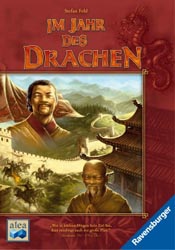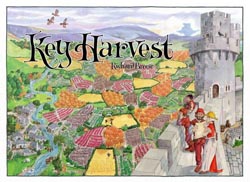 Alea has a very good reputation with me and I always look forward to their next game with interest. Although the English edition of their latest didn’t make it to Essen (Year of the Dragon by Rio Grande), I did get the German version and five of us sat down to test it out.
Alea has a very good reputation with me and I always look forward to their next game with interest. Although the English edition of their latest didn’t make it to Essen (Year of the Dragon by Rio Grande), I did get the German version and five of us sat down to test it out.
Players are Chinese rulers around the year 1000 and you are trying to protect yourself and your subjects as best as you can against disease, hunger or attacks from the Mongols while gaining prosperity and prestige. The game is played over 12 months (rounds) and each month is split into four phases. Firstly, each player picks one of seven possible actions, most of which activate workers in your palaces and gain you food, money or prestige points. In the second phase, you can recruit a new worker providing your palaces have space to accommodate him. Thirdly, an Event then takes place which, from the third month onwards, requires you to satisfy certain conditions (pay taxes, give up rice stocks etc.) If you are unable to meet the “cost” you will lose workers and, if your palaces then become uninhabited, they start to decay. Having dealt with the event, scoring takes place and you receive prestige points for each of your palaces, any court ladies you have recruited and any privelige tiles collected. After the 12th round, a final scoring takes place with bonuses for workers, buddhas and money remaining, following which whoever has the most prestige wins.
This is a very unforgiving game and, as you are bound to suffer some losses at some point during the game, you need to work out when is going to do least damage. Forward planning is critical. When we went through the rules, Nige thought it might be more fun to have the event tiles laid face down but we soon discovered that would have made the game impossible. I made a big mistake in one round, failing to anticipate exactly how much cash I was going to need two rounds later and it killed me. I hadn’t been doing brilliantly before then (paying 3 coins for my chosen action a few times as I was lagging behind on the person (turn order) track). However, my cashflow problem devastated my palace population and I knew that I was never going to recover. Nige was heavily into research and early on was raking in the prestige points. However, Mark K gave him some competition in research and that slowed him down. Mark G collected some priveliges and this brought him lots of points in each subsequent scoring but he, like me, got hit hard by events. Steve, on the other hand, managed to take some modest pain early on but then was able to build up a good cluster of palaces and crucially had buddhas in them at the end to score enough points in the final round to overtake Mark KÂ and tie for prestige with Nige. Unfortunately for Steve though, Nige was further advanced on the person track and claimed the win on the tiebreak.
This was another high quality game from Alea and designer Stefan Feld is making quite a name for himself with this joining Notre Dame as a big success.

 This week’s session of the Shrewsbury Boardgames Club on 30th November will be held at Nige’s house. I can’t attend due to our work Christmas do being that night.
This week’s session of the Shrewsbury Boardgames Club on 30th November will be held at Nige’s house. I can’t attend due to our work Christmas do being that night. This week, there were four of us so I decided to try out Richard Breese’s latest game, Key Harvest. I was looking forward to this as the ‘Key’ series of games has been filled with very good game ideas.
This week, there were four of us so I decided to try out Richard Breese’s latest game, Key Harvest. I was looking forward to this as the ‘Key’ series of games has been filled with very good game ideas. Alea has a very good reputation with me and I always look forward to their next game with interest. Although the English edition of their latest didn’t make it to Essen (Year of the Dragon by Rio Grande), I did get the German version and five of us sat down to test it out.
Alea has a very good reputation with me and I always look forward to their next game with interest. Although the English edition of their latest didn’t make it to Essen (Year of the Dragon by Rio Grande), I did get the German version and five of us sat down to test it out.